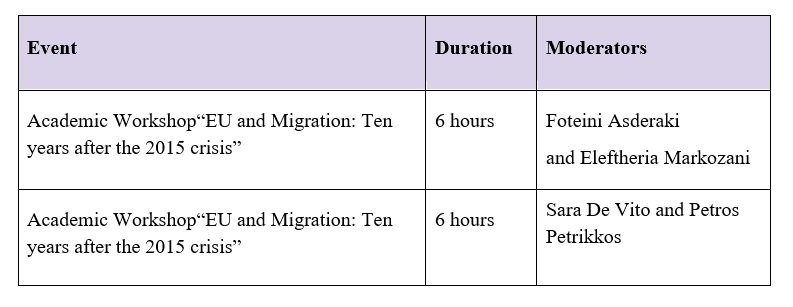Integration and protection of unaccompanied minors and vulnerable people
Elena Karagianni
Description/ objectives:
This workshop will focus on vulnerable groups of refugees and the policies of the EU for them
Refugees and immigrants are generally a community of people who are facing a series of difficulties, exclusions and deprivations both on a small scale but also on an institutional level. Within this large community of people there are other smaller communities that for other special reasons experience additional difficulties.
In this workshop we will have the opportunity to listen to some real human stories coming straight from the refugee camps. Stories of young people who came to Greece as unaccompanied children, and also stories from other vulnerable communities such us Lgbtq+ refugees, people with disabilities and more.
Taking a closer look to the Greek approach and some other approaches from other European countries we will try to understand what has there been done so far and the impact on the lives of these people.
Learning outcomes:
- From the “Safe Zone” to Real Life. Understanding the difficulties that refugee children but also other vulnerable group of people are facing..
- Understanding : Social Exclusion, institutionalization, and radicalization in Children and adolescence and other vulnerable people with migrant and refugee profile.
- Stories from the refugee camps: Stories from LGBTQ+, People with disabilities, elderly people,people with chronic diseases and from people who work with them.
Duration:
3 hours
Target Group:
Educators, professionals and practitioners working in the field of migration, NGOs, students.
Date:
June 2023, June 2024, June 2025
Working and Counseling with ethnic minorities
Dr Maria Voulgaridou
Description/ objectives:
The lab is designed to encompass three elements that are important in providing effective service to such populations: “Ethnicity” denotes cultural distinctiveness, which supplies meaning to the cross-cultural encounter between the counselor and the benefiters. The term “minorities” refers to specific groups who are relatively powerless, often receive unequal treatment and regard themselves as objects of discrimination. The term “counseling” requires that the counselor has to recognize the boundaries of their cultural values, signs and behavioral styles and to know how these boundaries are managed, protected and used in the counseling process.
Learning outcomes:
- Acquiring all the necessary tools to work effectively with migrants
- Learn the various cultural aspects that determine the behavior of migrants
Duration:
3 hours
Target Group:
professionals and practitioners working in the field of migration, NGOs, students
Date:
June 2023, June 2024, June 2025
The fundamentals of EU migration and asylum policy
Foteini Asderaki and Eleftheria Markozani
Description/ objectives:
This webinar will focus on presenting the main aspects of EU migration and asylum policy to school teachers so they can be ready to explain its particularities to their students.
Learning outcomes:
- The teachers will understand and learn the structure of the EU Migration Policy; will be competent in supporting refugee and migrant pupils; will learn the fundamental EU values on which EU policy is built.
Duration:
2 hours
Target Group:
Secondary teachers
Date:
June 2023, June 2024, June 2025
At the end of the second year, the MigratEUr project will organise an academic workshop on the “EU and Migration: Ten years after the 2015 crisis”. The workshop aims at realising the first scientific account of the progress made by the EU since the 2015 crisis and performing an academic review of the new pact. The event will be a two-day workshop which will result in the publication of the collective volume of the research articles presented in it.

The outputs of the workshop will be:
- Performing a scientific account of the developments since the 2015 crisis
- Offering new scientific research on the New Pact on Migration
- Stimulating the academic dialogue on the individual sub-topics of EU migration policy
- Offering a scientific contribution sustainable after the end of the project
The final activity of the program will be the organisation of an online open discussion in which the people will have the opportunity to listen to representatives of international organisations,the EU, the national administration and NGOs talking about the contemporary challenges and prospects of EU migration policy



